- Lithium Golf Cart Battery
- Forklift Lithium Battery
-
48V
- 48V 210Ah
- 48V 300Ah
- 48V 420Ah (949 x 349 x 569 mm)
- 48V 420Ah (950 x 421 x 450 mm)
- 48V 456Ah
- 48V 460Ah (830 x 630 x 590 mm)
- 48V 460Ah (950 x 421 x 450 mm)
- 48V 460Ah (800 x 630 x 600 mm)
- 48V 460Ah (820 x 660 x 470 mm)
- 48V 500Ah
- 48V 560Ah (810 x 630 x 600 mm)
- 48V 560Ah (950 x 592 x 450 mm)
- 48V 600Ah
- 48V 630Ah
-
48V
- 12V Lithium Battery
12V 150Ah Lithium RV Battery
Bluetooth App | BCI Group 31
LiFePO4 Lithium
Discharge Temperature -20°C ~ 65°C
Fast Charger 14.6V 50A
Solar MPPT Charging - 24V Lithium Battery
- 36V Lithium Battery
- 48V Lithium Battery
-
48V LiFePO4 Battery
- 48V 50Ah
- 48V 50Ah (for Golf Carts)
- 48V 60Ah (8D)
- 48V 100Ah (8D)
- 48V 100Ah
- 48V 100Ah (Discharge 100A for Golf Carts)
- 48V 100Ah (Discharge 150A for Golf Carts)
- 48V 100Ah (Discharge 200A for Golf Carts)
- 48V 150Ah (for Golf Carts)
- 48V 160Ah (Discharge 100A for Golf Carts)
- 48V 160Ah (Discharge 160A for Golf Carts)
-
48V LiFePO4 Battery
- 60V Lithium Battery
-
60V LiFePO4 Battery
- 60V 20Ah
- 60V 30Ah
- 60V 50Ah
- 60V 50Ah (Small Size / Side Terminal)
- 60V 100Ah (for Electric Motocycle, Electric Scooter, LSV, AGV)
- 60V 100Ah (for Forklift, AGV, Electric Scooter, Sweeper)
- 60V 150Ah (E-Motocycle / E-Scooter / E-Tricycle / Tour LSV)
- 60V 200Ah (for Forklift, AGV, Electric Scooter, Sweeper)
-
60V LiFePO4 Battery
- 72V~96V Lithium Battery
- Rack-mounted Lithium Battery
- E-Bike Battery
- All-in-One Home-ESS
- Wall-mount Battery ESS
-
Home-ESS Lithium Battery PowerWall
- 24V 100Ah 2.4kWh PW24100-S PowerWall
- 48V 50Ah 2.4kWh PW4850-S PowerWall
- 48V 50Ah 2.56kWh PW5150-S PowerWall
- 48V 100Ah 5.12kWh PW51100-F PowerWall (IP65)
- 48V 100Ah 5.12kWh PW51100-S PowerWall
- 48V 100Ah 5.12kWh PW51100-H PowerWall
- 48V 200Ah 10kWh PW51200-H PowerWall
- 48V 300Ah 15kWh PW51300-H PowerWall
PowerWall 51.2V 100Ah LiFePO4 Lithium Battery
Highly popular in Asia and Eastern Europe.
CE Certification | Home-ESS -
Home-ESS Lithium Battery PowerWall
- Portable Power Stations
Which Are the Best Manufacturers of 18650 Batteries in 2024?

In 2024, several manufacturers stand out as leaders in producing high-quality 18650 batteries, particularly those utilizing LiFePO4, NCA, NMC, and LTO chemistries. Key players include Panasonic, Samsung SDI, LG Chem, Ufine Battery, and EVE Energy. Understanding these options is essential for selecting the best battery for your specific needs.
What types of 18650 batteries are available?
18650 batteries come in various chemistries tailored for different applications:
- LiFePO4 (Lithium Iron Phosphate): Known for safety and longevity.
- NCA (Nickel Cobalt Aluminum Oxide): Offers high energy density suitable for power-intensive devices.
- NMC (Nickel Manganese Cobalt): Balances energy density and longevity; ideal for electric vehicles.
- LTO (Lithium Titanate Oxide): Prioritizes safety and longevity over high energy density.
Chart: Types of 18650 Batteries
| Chemistry | Characteristics | Applications |
|---|---|---|
| LiFePO4 | Long cycle life, safe | Energy storage systems |
| NCA | High energy density | Electric vehicles |
| NMC | Balanced energy density and lifespan | Power tools, EVs |
| LTO | Very safe, fast charging | High-power applications |
Who are the leading manufacturers of LiFePO4, NCA, NMC, and LTO batteries?
The leading manufacturers for these battery types include:
- Panasonic: Renowned for its high-performance lithium-ion batteries.
- Samsung SDI: A major player in both consumer electronics and automotive sectors.
- LG Chem: Offers a wide range of lithium-ion solutions with strong market presence.
- Ufine Battery: Specializes in customized lithium iron phosphate batteries.
- EVE Energy: Known for innovative designs and eco-friendly solutions.
How do different battery chemistries affect performance?
Battery chemistry significantly influences performance characteristics such as:
- Energy Density: Higher energy density means more energy stored per unit weight.
- Cycle Life: Refers to how many charge/discharge cycles a battery can undergo before its capacity drops significantly.
- Safety: Some chemistries offer better thermal stability and lower risk of overheating or combustion.
For instance:
- LiFePO4 has a longer cycle life but lower energy density compared to NCA and NMC.
- NMC provides a good balance between energy density and safety.
What features should you look for in a high-quality 18650 battery?
When selecting an 18650 battery, consider the following features:
- Capacity: Measured in mAh; higher capacity means longer usage time.
- Discharge Rate: Important for high-drain applications; look for ratings like CDR (Continuous Discharge Rating).
- Cycle Life: A longer cycle life indicates better longevity.
- Protection Features: Batteries with built-in protection circuits reduce risks of overcharging and overheating.
What should buyers consider when selecting a manufacturer?
Buyers should evaluate several factors when choosing a manufacturer:
- Reputation: Look for manufacturers with proven track records in quality and reliability.
- Certifications: Ensure compliance with international safety standards.
- Customization Options: Some manufacturers offer tailored solutions based on specific needs.
- After-Sales Support: Reliable customer service can be crucial for troubleshooting and support.
How does each manufacturer rank in terms of reliability and performance?
Based on industry reviews and expert opinions:
- Panasonic is often rated highest due to its innovation and quality control.
- Samsung SDI follows closely with strong performance metrics across various applications.
- LG Chem is recognized for its extensive product range and reliability.
- Ufine Battery offers competitive pricing with good customization options.
- EVE Energy, while newer to some markets, is gaining traction due to its eco-friendly approach.
Can alternatives to these manufacturers be considered for specific applications?
Yes, alternatives exist based on specific requirements:
- For budget-friendly options or custom solutions, consider companies like Redway Power, which specializes in high-quality lithium-ion products tailored to customer needs.
Tips for Battery Wholesale Buyers
When looking to purchase from reliable manufacturers like Redway Power, keep these key points in mind:
- Assess the manufacturer’s experience and reputation within the industry.
- Request samples or prototypes before making large orders to ensure quality.
- Verify compliance with international safety standards to avoid future issues.
- Discuss customization options that may better suit your application needs.
- Establish clear communication channels for ongoing support post-purchase.
With over 13 years of experience as a well-known lithium battery manufacturer, Redway Power is an excellent choice for wholesale buyers looking for reliable products.
Redway Power Expert Views
“Selecting the right manufacturer is critical to ensuring that your applications perform optimally,” states a representative from Redway Power. “We focus on delivering customized solutions that meet our clients’ unique needs while maintaining the highest standards of quality.”
FAQ Section
- What types of chemistries are used in 18650 batteries?
The main chemistries include LiFePO4, NCA, NMC, and LTO, each offering unique benefits suited to different applications. - Who are the top manufacturers of 18650 batteries?
Leading manufacturers include Panasonic, Samsung SDI, LG Chem, Ufine Battery, and EVE Energy. - What factors should I consider when choosing an 18650 battery?
Consider capacity, discharge rate, cycle life, protection features, and manufacturer reputation when selecting an 18650 battery.

























